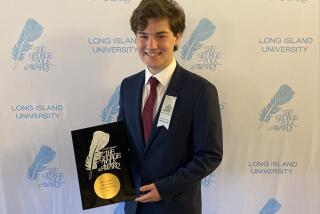Genentech-UC Patent Trial Ends With Mixed Verdict
- Share via
A federal jury Wednesday upheld a University of California patent on a genetically engineered human growth hormone but deadlocked on whether biotechnology company Genentech had infringed the patent in producing its version of the hormone.
The mixed verdict in the University of California Regents vs. Genentech sets the stage for yet another trial in this widely watched patent case, which raised questions about how the company obtained the technology it used when it first produced the drug Protropin two decades ago.
The jurors in the San Francisco patent case split 8 to 1 in support of the university’s infringement claim--with a lone juror holding out for Genentech despite the strong feelings of the others.
Company officials hailed the lack of a decisive verdict as a victory for the scientists who developed Protropin, which is used to treat short children who have a deficiency of the natural hormone.
“This is really a tremendous victory for us,” said Sean Johnston, Genentech’s vice president for intellectual property. “They did not uphold the infringement in the face of this extremely troubling testimony.”
Johnston was referring to testimony by former Genentech scientist Peter Seeburg that on New Year’s Eve in 1978 he removed a human growth hormone gene fragment and other materials from the University of California at San Francisco laboratory where he worked before taking a job at the young biotech company. Contradicting earlier sworn depositions, Seeburg testified that the gene fragment was used by Genentech scientists to produce Protropin.
Johnston said that after the verdict a number of jurors said informally that they did not believe Seeburg’s testimony, which was flatly denied by other Genentech scientists. “The credibility of our scientific work had been called into question,” he said. “It was very important for us to disprove that and we believe we did that.”
The university’s lead attorney, Gerald P. Dodson, said, “Genentech should take no comfort in the result. But we can’t say we got the victory we wanted. We have to continue to pursue the fight, and I think the university is willing to pursue it.”
He blamed the deadlock on the one holdout juror. He said that lawyers for the UC system began making the case for the removal of the juror after the foreman sent out a note saying that during deliberations one member of the panel was refusing to listen to the evidence.
While describing the jury’s action as a disappointment, Dodson said that he was pleased that the jurors unanimously agreed that the university patent was valid--that it could be used to produce human growth hormone. Genentech attorneys had attacked the UC patent on the ground that it was not “enabling”--or useful for drug production.
Dodson said that a retrial could begin in the next few months and that he hoped that the judge would allow a jury to hear the university’s claims against Protropin as well as Nutropin, a newer version of the human growth hormone that was excluded from the first trial.
If the university prevails in the case, it could mean penalties in excess of $1 billion for the company--even more if a new jury should find infringement in the case of both hormone products.
More to Read
Sign up for Essential California
The most important California stories and recommendations in your inbox every morning.
You may occasionally receive promotional content from the Los Angeles Times.













